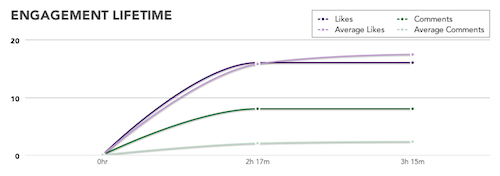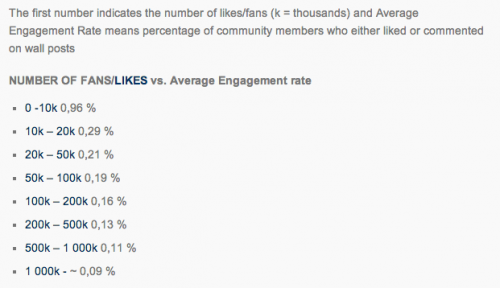 April 1, 2013
April 1, 2013 6 Shocking Reasons Your Facebook Fans Aren’t Engaged [Part 1 of 2]

This article was co-written by Jon Ostrow and Ariel Hyatt
Last week, we discussed some major obstacles that are stopping your effective growth on your Facebook fan page.
Facebook is making it almost impossible for the non-advertiser to create effective engagement, but there is no doubt that there is also human error involved as well. Take a look at last week’s article for a full breakdown.
The reaction from that article made us realize something…
A vast majority of social media users are still unaware of just how difficult growth of a Facebook fan page can actually be.
This data is not meant to scare you away from building your community on Facebook, the purpose is to shine a light on the harsh reality that is Facebook-centric community building.
With this understanding, we hope to help you set more realistic goals, put more effective strategies in place and build stronger fan communities:
1. Average Life of a Facebook Post
One common complaint about the internet in general by new users (or non-users) is that they don’t like the idea that something published online ‘lives forever’.
Well fret not… because this couldn’t be further from the truth.
Yes, your content will technically be online, but the average lifespan of a Facebook post is just a short 3 hours. This means that after the average 3 hour timespan, your Facebook posts will no longer show up in any of your fans’ news feeds.
[caption id=”attachment_9290” align=”aligncenter” width=”500”] Image Source: edgerankchecker.com[/caption]
Image Source: edgerankchecker.com[/caption]
Although this is actually a far higher number than, say, Twitter (see: 18 minutes of fame), this does mean that you MUST understand when your fans are online and most likely to engage with your posts so that each day you post in your most effective 3 hour window.
2. Average % of Total Fan Base Willing to Engage with a Brand Page
As we discussed last week, Mashable covered a recent study by Napkin Labs that exposed the shocking statistic that only 6% of a total fan base will ever actually engage with a brand page:
On average, just 6% of fans engage with a brand’s Facebook Page via likes, comments, polls and other means, according to a study from Napkin Labs, a Facebook app developer that works with brands and agencies. Of those fans that did, the average engagement was the equivalent of less than one like over the course of the eight weeks the study was conducted.
While this does fuel the fire of the argument that you need more fans - A LOT more fans - in order to build any sort of community on your Facebook page, this study actually contributes to the idea of having 1,000 True Fans (see Ariel’s series on that here).
The fact that 6% of a total fan base will engage with a brand page is partially because of Facebook’s algorithm… Facebook’s ‘Edge Rank’ algorithm is a system that ranks and displays only the most ‘relevant’ and ‘important’ content on your news feed from your friends and pages you have liked. But the issue of your fan base lacking engagement also has a lot to do with the fact that the overwhelming majority of the average fan base is made up of ‘Ambient’ or even ‘Engaged’ fans, and not the kind of ‘Super Fans’ needed to truly build a consistently engaged community.
3. Average Engagement Rate
And as scary as the ‘6%’ stat above is, this one gets even more frightening…
There have been several recent studies done on the actual average engagement rate of a page (the ‘People Talking About This Page’ number) and it is shown that the average engagement rate of a fan page is only .96% (yes, that’s less than 1%).
THIS MEANS: Anything above a 1% engagement is considered strong, results-wise.
The difference between this stat and the one above (See #2) is that the number above reflects the percentage of fans who are EVER willing to engage with a page over the lifetime of the relationship. In other words, for the average fan page, 94% of your fans never have nor will they ever engage.
Meanwhile, this stat reflects the true engagement of a fan page on Facebook’s rolling 7 day scale. In other words, within 7 days (on average), the # of ‘People Talking About This Page’ / the # of ‘Total Fans’ will equal around 1%.
Here is a great matrix from Michael Leander that shows how this engagement rate actually breaks down:
[caption id=”attachment_9291” align=”aligncenter” width=”500”] Image Source: http://www.michaelleander.me[/caption]
Image Source: http://www.michaelleander.me[/caption]
On Next Week’s Installment…
Next week, we will continue with Part 2 of this series where we will discuss why your visibility and engagement are so low, and why you’re Facebook posts won’t be going ‘viral’ any time soon.






Reader Comments (6)
I've significantly cut back on my comments and likes on Facebook after the new search function was announced. Not knowing what will turn up about me in those searches, I've limited my visible interactions on Facebook.
While I can limit who sees what I do on my own Facebook page, what I do on other Facebook pages is controlled by those Facebook page owners. Unfortunately, I just don't trust Facebook and am using it much less these days.
I find these stats comforting. :)
Ariel - do you happen to have a direct link to Michael Leander's methodology for collecting that information? I find that it's perhaps a bit off from my experience. Specifically, I'm curious if he broke up his case study between bands that posted at least once in the last week versus bands that haven't. I like the idea of fan tiers and have noticed a drop off in engagement with the larger bands. Thank you in advance for your time!
I find facebook pretty much useless as far as trying to market my music.
I run a digital distribution site and we spend a lot of time discussing and educating our artists on this topic. It may seem like the work is done after we distribute the music, but that is actually when it starts.
Digital music promotion is something that the artist needs to spend considerable time on or hire someone to do. As an entrepreneur, me and my team are constantly on the lookout for some idea that will work for artists, but the truth is that the best marketing you can get for your music (unless you have a very large amount of money) is actually getting it recommended by others. Word of mouth works. Getting that going is about starting small. Talking directly to your most ardent fans.
Discuss where you should do your next gig, what they think about the mix, the lyrics etc. If you can get an emotional connect you are on your way.
I like your first tip - average life of a facebook post - because too often, companies forget that the reach is limited by time and interaction. I'll be back to read more from you!